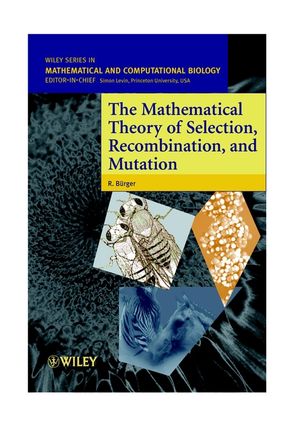The Mathematical Theory of Selection, Recombination, and MutationISBN: 978-0-471-98653-9
Hardcover
424 pages
November 2000
 This is a Print-on-Demand title. It will be printed specifically to fill your order. Please allow an additional 10-15 days delivery time. The book is not returnable.
|
||||||
"It is close to being a masterpiece...could well be the classic
presentation of the area." Warren J. Ewens, University of
Pennsylvania, USA
Population genetics is concerned with the study of the genetic, ecological, and evolutionary factors that influence and change the genetic composition of populations. The emphasis here is on models that have a direct bearing on evolutionary quantitative genetics. Applications concerning the maintenance of genetic variation in quantitative traits and their dynamics under selection are treated in detail.
* Provides a unified, self-contained and in-depth study of the theory of multilocus systems
* Introduces the basic population-genetic models
* Explores the dynamical and equilibrium properties of the distribution of quantitative traits under selection
* Summarizes important results from more demanding sections in a comprehensible way
* Employs a clear and logical presentation style
Following an introduction to elementary population genetics and discussion of the general theory of selection at two or more loci, the author considers a number of mutation-selection models, and derives the dynamical equations for polygenic traits under general selective regimes. The final chapters are concerned with the maintenance of quantitative-genetic variation, the response to directional selection, the evolutionary role of deleterious mutations, and other topics.
Graduate students and researchers in population genetics, evolutionary theory, and biomathematics will benefit from the in-depth coverage. This text will make an excellent reference volume for the fields of quantitative genetics, population and theoretical biology.
Population genetics is concerned with the study of the genetic, ecological, and evolutionary factors that influence and change the genetic composition of populations. The emphasis here is on models that have a direct bearing on evolutionary quantitative genetics. Applications concerning the maintenance of genetic variation in quantitative traits and their dynamics under selection are treated in detail.
* Provides a unified, self-contained and in-depth study of the theory of multilocus systems
* Introduces the basic population-genetic models
* Explores the dynamical and equilibrium properties of the distribution of quantitative traits under selection
* Summarizes important results from more demanding sections in a comprehensible way
* Employs a clear and logical presentation style
Following an introduction to elementary population genetics and discussion of the general theory of selection at two or more loci, the author considers a number of mutation-selection models, and derives the dynamical equations for polygenic traits under general selective regimes. The final chapters are concerned with the maintenance of quantitative-genetic variation, the response to directional selection, the evolutionary role of deleterious mutations, and other topics.
Graduate students and researchers in population genetics, evolutionary theory, and biomathematics will benefit from the in-depth coverage. This text will make an excellent reference volume for the fields of quantitative genetics, population and theoretical biology.



